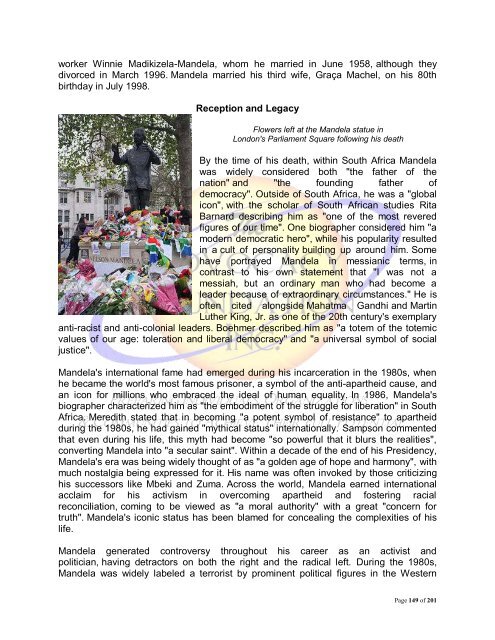You also want an ePaper? Increase the reach of your titles
YUMPU automatically turns print PDFs into web optimized ePapers that Google loves.
worker Winnie Madikizela-Mandela, whom he married in June 1958, although they<br />
divorced in March 1996. Mandela married his third wife, Graça Machel, on his 80th<br />
birthday in July 1998.<br />
Reception and Legacy<br />
Flowers left at the Mandela statue in<br />
London's Parliament Square following his death<br />
By the time <strong>of</strong> his death, within South Africa Mandela<br />
was widely considered both "the father <strong>of</strong> the<br />
nation" and "the founding father <strong>of</strong><br />
democracy". Outside <strong>of</strong> South Africa, he was a "global<br />
icon", with the scholar <strong>of</strong> South African studies Rita<br />
Barnard describing him as "one <strong>of</strong> the most revered<br />
figures <strong>of</strong> our time". One biographer considered him "a<br />
modern democratic hero", while his popularity resulted<br />
in a cult <strong>of</strong> personality building up around him. Some<br />
have portrayed Mandela in messianic terms, in<br />
contrast to his own statement that "I was not a<br />
messiah, but an ordinary man who had become a<br />
leader because <strong>of</strong> extraordinary circumstances." He is<br />
<strong>of</strong>ten cited alongside Mahatma Gandhi and Martin<br />
Luther King, Jr. as one <strong>of</strong> the 20th century's exemplary<br />
anti-racist and anti-colonial leaders. Boehmer described him as "a totem <strong>of</strong> the totemic<br />
values <strong>of</strong> our age: toleration and liberal democracy" and "a universal symbol <strong>of</strong> social<br />
justice".<br />
Mandela's international fame had emerged during his incarceration in the 1980s, when<br />
he became the world's most famous prisoner, a symbol <strong>of</strong> the anti-apartheid cause, and<br />
an icon for millions who embraced the ideal <strong>of</strong> human equality. In 1986, Mandela's<br />
biographer characterized him as "the embodiment <strong>of</strong> the struggle for liberation" in South<br />
Africa. Meredith stated that in becoming "a potent symbol <strong>of</strong> resistance" to apartheid<br />
during the 1980s, he had gained "mythical status" internationally. Sampson commented<br />
that even during his life, this myth had become "so powerful that it blurs the realities",<br />
converting Mandela into "a secular saint". Within a decade <strong>of</strong> the end <strong>of</strong> his Presidency,<br />
Mandela's era was being widely thought <strong>of</strong> as "a golden age <strong>of</strong> hope and harmony", with<br />
much nostalgia being expressed for it. His name was <strong>of</strong>ten invoked by those criticizing<br />
his successors like Mbeki and Zuma. Across the world, Mandela earned international<br />
acclaim for his activism in overcoming apartheid and fostering racial<br />
reconciliation, coming to be viewed as "a moral authority" with a great "concern for<br />
truth". Mandela's iconic status has been blamed for concealing the complexities <strong>of</strong> his<br />
life.<br />
Mandela generated controversy throughout his career as an activist and<br />
politician, having detractors on both the right and the radical left. During the 1980s,<br />
Mandela was widely labeled a terrorist by prominent political figures in the Western<br />
Page 149 <strong>of</strong> 201

















